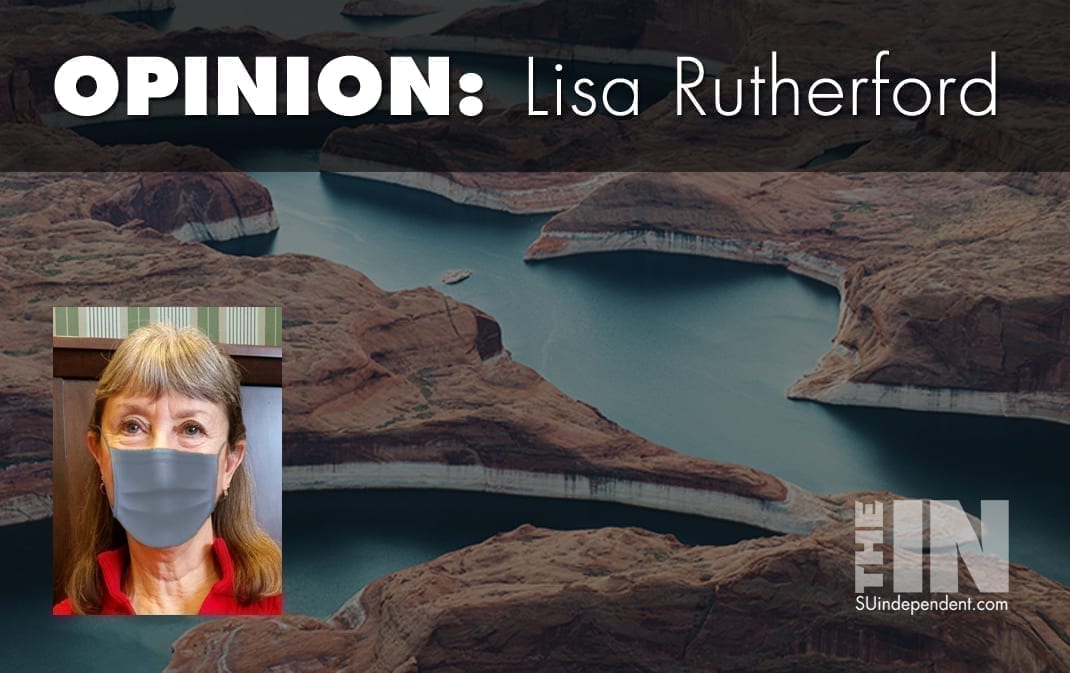
Lake Powell Pipeline and Northern Corridor
Environmental Reviews Skewed by Politics
The National Environmental Policy Act (enacted January 1970) is supposed to provide the public with the opportunity for public involvement in the environmental review process for projects that could result in adverse environmental impacts.
What we have seen lately by agencies and officials who influence those agencies is an effort to undermine the public process. Back in December 2019, the public was given a mere 30 days to provide scoping comments on two massive projects planned for Washington County: Lake Powell Pipeline and Northern Corridor Highway through Red Cliffs National Conservation Area.
Now, we are now faced with another public comment period on the two newly Drafted Environmental Impact Statements (DEISs) prepared by the agencies on these two projects. The public has additional time to comment on the plans. Still, the fact that they are heaped on the people at the same time seems to indicate that the agencies do not respect the public’s lives, particularly during this challenging pandemic period.
But do the agencies have ultimate control over when these DEISs must be released for public review? Who is calling the shots?
Given the direction conveyed from on high by President Trump to move projects along by streamlining the approval process— reducing restrictions and public involvement— these agency people are not calling the shots. However, they may support what he is doing. They are mere pawns. But I doubt President Trump is making these decisions on his own. He must be getting input that suits his plan from others, and the evidence points to our Utah politicians – some of those most dedicated to undermining environmental laws.
Agency experts, who know the issues in detail, and have the scientific education and background, are the ones who should be in control. However, it appears as though they are faced with political pressure and taking their marching orders from politicians who wrongly control their lives. Politicians who, most often, have little concern for the impact their decisions have on the public through projects they push without adequately vetting. This behavior, of course, is nothing new, but it is something that really should be challenged.
For example, for over one hundred years, politicians have been pushing the Bureau of Reclamation to ignore the science that shows less Colorado River flow than was initially measured. That incorrect higher flow number has been used by politicians to encourage growth in areas dependent on the Colorado River and bring money to their states for water projects.
Our local, state, and national officials have been pushing for the Lake Powell Pipeline and the Northern Corridor Highway for fourteen years – some longer – and they want what they want no matter how they get it. A new book by Eric Kuhn and John Fleck—Science Be Dammed—nails it. No matter what the facts reveal, politicians keep pushing. In fact, at the June Utah Water Development Commission meeting, Representative Phil Lyman of Recapture Canyon, ‘illegal’ ride fame was pushing for more big water projects in Southern Utah!
It is clear from my review of the Draft Environmental Impact Statements for both projects, but particularly the LPP DEIS, that project alternatives are not being fairly evaluated and considered. Transportation alternatives that would meet our county’s needs are possible and should be given serious consideration before rushing to build a $150 million road through a pristine and “protected” area. Likewise, a reasonable and cheaper conservation alternative to the proposed $1.8-$2 billion LPP should receive the consideration it is due given the science showing the Colorado River cannot sustain the demands on it. Again, politicians are ignoring science and pushing agencies to make bad decisions.
What is needed are citizens who have a stake in these decisions and the desire to see a more balanced review that considers alternatives reasonably; then, they need to speak out.
Comments on the proposed Lake Powell Pipeline DEIS can be made until September 8. Comments on the proposed Northern Corridor Highway through our Red Cliffs National Conservation Area and Red Cliffs Desert Reserve can be made until September 12. Conserve Southwest Utah (www.conserveswu.org) has excellent information to help citizens make “substantive” comments that will be considered by the agencies. Let’s not allow politicians to rule the day.
Viewpoints and perspectives expressed throughout The Independent are those of the individual contributors. They do not necessarily reflect those held by the staff of The Independent or our advertising sponsors. Your comments, rebuttals, and contributions are welcome in accordance with our Terms of Service. Please be respectful and abide by our Community Rules. If you have privacy concerns you can view our Privacy Policy here. Thank you!
Click here to submit an article, guest opinion piece, or a Letter to the Editor





Hello Lisa. Here is a copy of a letter sent to the BLM and Fish & Wildlife Service:
To: Bureau of Land Management (BLM) and U.S. Fish & Wildlife Service.
I have been reading with some dismay the ongoing proposal to build a Northern Corridor through the Red Cliffs National Conservation Area.
My question is, does the term National Conservation Area have any meaning any longer to our government? The concept of Conservation means just that…to conserve.
It does not mean that we can arbitrarily choose to develop part of such an area. I recognize that there is a strong push by developers and city planners to build this new highway through the Conservation Area. I also recognize that this push is driven by greed and an unwillingness to plan for the future.
Furthermore, there are other options for a highway location. These other options are not nearly as disruptive to the animals and plants that live in this area. Nor will they disrupt the scenic beauty of the area.
It is quite ironic that one of the draws of the St. George area is our spectacular scenery, geology and overall ambiance. I’ve seen that the “city fathers” like to boast about how fast St. George is growing and being developed. Yet I do not hear any well thought out plans for future water sources such as the pipeline or the Navajo Aquifer, traffic problems and city infrastructure. All I hear is growth, growth, and more growth.
Are we blind to the future because of the drive for growth and profit? Is it not possible to curb this insatiable desire to destroy the environmental beauty and biological diversity for the sake of enriching a few while irreparably damaging our ecosystems?
So, I am asking for our future and our children’s future to not disrupt the Conservation Area, especially since there are other options.to consider that will allow us to preserve the natural rarity that is southern Utah.
Sincerely,
Rick Miller PhD
Geologist & Paleontologist
Rick, I, too, am hoping for some reasonableness to become apparent on the part of decision makers with regard to these two projects. The Bureau of Reclamation’s virtual public meeting last night (another one tonight, if you’re interested in more of their blather) was evidence that the BOR has drunk the Kool-Aid (Kook-Aid?) offered by our politicians and others who support the LPP. They are willing to encourage citizens to become indebted for a project that is not necessary, extremely costly and extremely risky given the future of the Colorado River.
Are we talking about the Chris Stewart memorial highway again? It’s his legacy. Come on Rick & Lisa, politicians legacies matter! His great great grand kids will no doubt be proud of their ancestor. Well there is good news on the horizon. A new day is soon to be rising. I have never been so hopeful about the future then in this current time. Keep the faith. God works in mysterious ways. And for the atheists out there, have faith in the universe. Peace – Out.
Just follow the money. There are few reasons that a politician would completely ignore the greater good except for some kind of monetary gain–whether it’s a public matter matter or not.